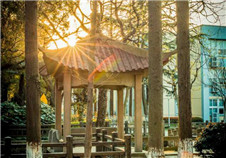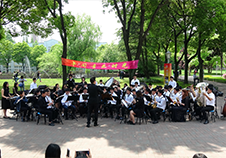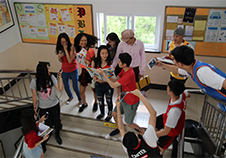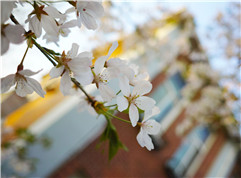
News
G1-3: Chinese Culture Week-The Roar of the Dragon Echoes Through the Ages, Children Learn Poems and Paintings in Four Seasons
The Chinese Cultural Week event arrived on the gentle spring breeze. Children from grades 1 to 3 opened the doors of history this week, engaging in dialogues with emperors, commoners, and literati.
Grade One: Dragon Chants, Soaring Through the Forbidden City
“With a bellowing “dong”, the Meridian Gate opened, and the first-grade children entered in an orderly manner. As they leisurely strolled through the quiet courtyard, they felt the grandeur of the Forbidden City’s architecture, and through the rotations of activities, they experienced the lives of its historical figures. The journey of “Dragon Chants, Soaring Through the Forbidden City” opened a door to history for the first-grade children, allowing them to converse with the past and engage with tradition.
On Monday, the children learned about the Forbidden City’s architecture through a documentary and completed related knowledge quizzes. They also virtually toured the Forbidden City through a mobile app, witnessing the majestic Hall of Supreme Harmony standing tall in the Square. The vermilion gates exuded solemnity; the roof ridge animals appeared lifelike; the carved beams and painted rafters exuded nobility and elegance. Their minds wandered along the ancient cobblestone paths, absorbing its prowess, while gaining considerable knowledge about its history and distinct style.
On Tuesday, the children competed in the “Forbidden City Figures Knowledge Competition” to become “Week’s Scholar of the Forbidden City.” They learned a multitude of interesting facts. The emperor’s chef was called the Imperial Chef. The emperor’s means of transportation was the Dragon Chariot. The princes couldn’t have holidays at will. The empress had to manage household affairs and perform rituals. Their confident expressions revealed a strong interest in Forbidden City knowledge.
On Wednesday, the children “traveled back to ancient times,” dressed in traditional costumes, to explore the secrets of compound characters and design a compound character as decoration for the Forbidden City’s architecture. Expressions like “Perfection in Every Aspect” and “May You Have Fish Every Year” expressed longing for a better life, while phrases like “Spring and Clear Scenery” and “Dragon and Phoenix Bring Auspiciousness” conveyed wishes for favorable weather. Through each stroke, tradition and the present intertwined, breathing new life into these auspicious phrases.
On Thursday, the children had the opportunity to try their hand at “dubbing.” They learned to speak like ancient people and dubbed for characters in a play. The serious demeanor of the “Little Emperor” and the instructive tone of the “Empress Dowager” were both amusing. Through this, our children learned that although princes enjoyed wealth and glory, they had to rise early and study diligently, much harder than today’s students.
On Friday, if you walked into the first-grade corridor, it felt like stepping into a Forbidden City cultural and creative shop. The corridor was adorned with canvas bags featuring elements of the Forbidden City. Look at this one, ah, the majestic Hall of Supreme Harmony. And that one, a princess in gorgeous attire showcasing her new dress. The children proudly introduced their cultural and creative projects to the class.
As scrolls depicting scenes of courtiers attending court and the lively scenes of palace banquets unfolded before the children’s eyes, they couldn’t help but wonder: what was life like for those who lived and worked in the Forbidden City? What was the study life of princes and princesses like? To answer these questions, the teachers carefully selected “Hello, Forbidden City: People” and “Hello, Forbidden City” radio dramas for the children. Emperors, empresses, princesses and princes took the stage to narrate their daily lives to the children. After reading these materials, the answers presented in their reading reports were particularly interesting: “If I could travel back to ancient times, I would want to be an emperor. Then I could expand my territory and govern my kingdom well.” These readings helped them understand that regardless of one’s family background or position, everyone has responsibilities and obligations to fulfill, even the emperor, who cannot simply do as he pleases.






Grade Two:Odes to the Solar Terms
Seasons come and go, and life continues its cycle. The twenty-four solar terms have been a part of Chinese people's lives for thousands of years. Therefore, this year's cultural week theme for the second grade was "Odes to the Solar Terms."
Several weeks ago, the second-grade students had already entered the prelude to Chinese Culture Week, engaging in group exploratory activities related to "solar terms," asking questions widely and reading deeply, preparing to introduce their findings to teachers and classmates from other classes.
On Monday, the cultural week's series of activities on the twenty-four solar terms officially kicked off. Teachers guided the children to browse picture books, search for information, select the iconic tastes, colors, or phenological phenomena of each solar term, and create solar term disks, depicting the beauty of the four seasons and appreciating the depth of human culture.
On Tuesday, amidst the beautiful spring weather and the flourishing of all things, we approached the solar terms belonging to spring, learned about related customs, sought the essence of spring, and "sealed" it in a "spring bottle" to preserve the footsteps of spring.
On Wednesday, the students donned traditional costumes and entered the refreshed classrooms. The classrooms had been arranged into eight distinct corners representing each solar term, allowing one to feel as though they were traveling through the ever-changing seasons. Some children walked out of the classroom in pairs to visit the exploratory results of other classes, while others stayed in front of their group's work, confidently introducing their poster content to the audience and answering questions. Through these exchanges, the children experienced the wisdom and joy of ancient life.
On the fourth day of Culture Week, children from eight classes took turns to step onto the stage, singing the joys of the solar terms and expressing the beauty of each term through song. The melodious and captivating voices sang out the unique romanticism of the Chinese people.
On Friday, the children were eager and brought their individual solar term exhibitions. Each child took to the podium, introducing their written and artistic works and sharing in-depth knowledge about a specific solar term with their classmates. Different solar terms came together to form a "Song of the Four Seasons."





Grade Three:Dragon's Roar, Poetic Soul
With a gentle breeze and the sun shining brightly, the enthusiastic third-grade students embarked on a delightful five-day journey called "Poetry Reveals the World." During this time, ancient elegance intertwined with youthful innocence, and poetry and laughter filled the air, creating enchanting and poetic scenes.
On the first day, guided by their teachers, the students traveled through time and became friends with the renowned poet Li Bai. They transformed into little poets, reciting Li Bai's timeless verses. Through documentaries and books, they unveiled the mystery behind this great poet's name. Beyond his poetry, they discovered a Li Bai much like you and I, experiencing joy, anger, sorrow, and happiness. They learned about a Li Bai who valued friendship, cherished nature, and had a deep love for life.
On the second day, the students accompanied their teachers to explore the stories behind the classic imagery of "clouds, moon, mountains, and flowers" in ancient Chinese poetry. They gained an initial understanding of how the ancients used objects to express their aspirations. They also discovered why majestic mountains and rivers, the companionship of winter bamboo, the ever-changing clouds, and the waxing and waning moon were beloved themes among generations of poets. Finally, armed with paintbrushes, the children created their own whimsical world by merging the imagery from the poems into their artwork. The landscapes in their paintings intertwined like a fairyland, and the flowers, birds, insects, and fish complemented each other. The bright moon shone in the sky, accompanied by auspicious clouds and a crescent moon with a hook. Through their learning, the children consciously incorporated elements of classical aesthetics into their own artwork. Each painting was filled with imagination, creativity, and the timeless charm of poetry.
On the third day, the students traced their ancestral roots and recited classic poems in different dialects. The air was filled with various regional accents, adding to the joy and innocence of the occasion. This unique poetry recitation event amazed the children as they realized that despite our different accents and tones, we could understand each other quite well because these dialects belong to one big family—our shared mother tongue, the Chinese language!
Next came the moment of creating artistic calligraphy. Using small regular script for the first time, the students experienced the elegance of ancient Chinese brushwork and the beauty of writing Chinese characters. Carefully, beside their artwork, they wrote ancient poems that corresponded to the imagery in their paintings. Every stroke was filled with their love and respect for Chinese culture. Watching the children's focused expressions, one could see the future inheritors of Chinese culture.
On the last day, the young poets showcased their talents in a poetry challenge. Some recited famous poems flawlessly, while others spontaneously created clever verses. Through this activity, the students accumulated cultural knowledge and poetic inspiration. After an intense competition, each class chose a "Poetry Champion." The children cheered and celebrated, proud of their achievements.



Throughout the week’s activities, the children virtually visited the Forbidden City, explored the traditional Chinese solar terms, and appreciated poetry through recitation and composition. This dialogue between ancient and modern times allowed them to step into the lives of emperors, commoners, and literati, experiencing the sentiments and ideals that have sustained the Chinese people for thousands of years. In a relaxed and enjoyable atmosphere, the children savored the charm and fascination of Chinese culture. May they continue to explore the treasures of Chinese culture in the days to come, becoming small messengers who inherit and promote Chinese civilization, thus illuminating the brilliance of Chinese cultural treasures!
Written by Thea Chen, Yuanjing Zhang, Yu Lin
Pictures by Teachers and Parents Volunteers
Edited by Cong Luo, Bianca Noguera











